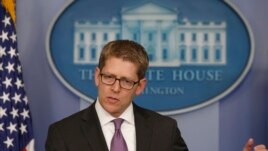Washington React: Obama Aims to Work With Putin to Calm Ukraine
WHITE HOUSE — The United States says it respects Russia's interests in Ukraine, but that it expects Moscow to pull its troops back to their bases and stop violating Ukraine's sovereignty.
But Russia is showing no signs of backing down as troops continue to take up positions in Crimea and a Russian-sponsored referendum that could result in the region becoming part of the Russian Federation draws near.
The Obama administration is trying to give Russia a way out of the crisis. White House spokesman Jay Carney on Tuesday said the U.S. goal is to see a de-escalation of the situation.
“We are working to see if the Russians are willing to resolve this matter diplomatically," he said.
Secretary of State John Kerry spoke on the telephone with Russian Foreign Minister Sergei Lavrov for 45 minutes on Tuesday, but reported no progress.
Carney indicated the United States is not opposed to a continued Russian role in Crimea, as long as Russian troops return to their bases.
“What we're talking about when we say that we absolutely recognize that Russia has interests in Ukraine and they include in Crimea, we're referring specifically to the Black Sea fleet base - for example - which is in Crimea, a Russian naval base as part of an agreement with the sovereign nation of Ukraine and that we completely respect," Carney said.
One of the reasons Russia has given for intervening in Crimea is its concern for what it says is the rights of the ethnic Russian minority living there. The Obama administration has called on the Ukrainian government to honor the rights of ethnic Russians, but has also said it does not believe Russian reports that members of that minority have been abused.
In the meantime, U.S. officials say they are assessing whether to begin implementing the visa restrictions and financial sanctions that President Obama announced last week if Russia continues its moves to consolidate control over Crimea.
Analyst Michael O'Hanlon with the Brookings Institution in Washington says the Obama administration will have no choice but to step up penalties if Russia makes no concessions.
“If things stay as they are, I think we need to apply some sanctions that are hurtful to the Russian elite," O'Hanlon said. "I’m not suggesting broad-based sanctions based on this referendum and potential annexation of Crimea. I’m not suggesting we try to go after their energy sector or all their banks. But I think that Putin and his cronies need to have some targeted sanctions on their visas, their travel and their bank accounts and be put in place and stay in place.”
The United States also wants Russia to begin a dialogue with the Ukrainian government, which Moscow does not recognize.
Obama is preparing to host Ukraine's interim prime minister, Arseniy Yatsenyuk, on Wednesday. The invitation is a message to Russia that the new Ukrainian government has Washington's support.
But Russia is showing no signs of backing down as troops continue to take up positions in Crimea and a Russian-sponsored referendum that could result in the region becoming part of the Russian Federation draws near.
The Obama administration is trying to give Russia a way out of the crisis. White House spokesman Jay Carney on Tuesday said the U.S. goal is to see a de-escalation of the situation.
“We are working to see if the Russians are willing to resolve this matter diplomatically," he said.
Secretary of State John Kerry spoke on the telephone with Russian Foreign Minister Sergei Lavrov for 45 minutes on Tuesday, but reported no progress.
Carney indicated the United States is not opposed to a continued Russian role in Crimea, as long as Russian troops return to their bases.
“What we're talking about when we say that we absolutely recognize that Russia has interests in Ukraine and they include in Crimea, we're referring specifically to the Black Sea fleet base - for example - which is in Crimea, a Russian naval base as part of an agreement with the sovereign nation of Ukraine and that we completely respect," Carney said.
One of the reasons Russia has given for intervening in Crimea is its concern for what it says is the rights of the ethnic Russian minority living there. The Obama administration has called on the Ukrainian government to honor the rights of ethnic Russians, but has also said it does not believe Russian reports that members of that minority have been abused.
In the meantime, U.S. officials say they are assessing whether to begin implementing the visa restrictions and financial sanctions that President Obama announced last week if Russia continues its moves to consolidate control over Crimea.
Analyst Michael O'Hanlon with the Brookings Institution in Washington says the Obama administration will have no choice but to step up penalties if Russia makes no concessions.
“If things stay as they are, I think we need to apply some sanctions that are hurtful to the Russian elite," O'Hanlon said. "I’m not suggesting broad-based sanctions based on this referendum and potential annexation of Crimea. I’m not suggesting we try to go after their energy sector or all their banks. But I think that Putin and his cronies need to have some targeted sanctions on their visas, their travel and their bank accounts and be put in place and stay in place.”
The United States also wants Russia to begin a dialogue with the Ukrainian government, which Moscow does not recognize.
Obama is preparing to host Ukraine's interim prime minister, Arseniy Yatsenyuk, on Wednesday. The invitation is a message to Russia that the new Ukrainian government has Washington's support.



No comments:
Post a Comment